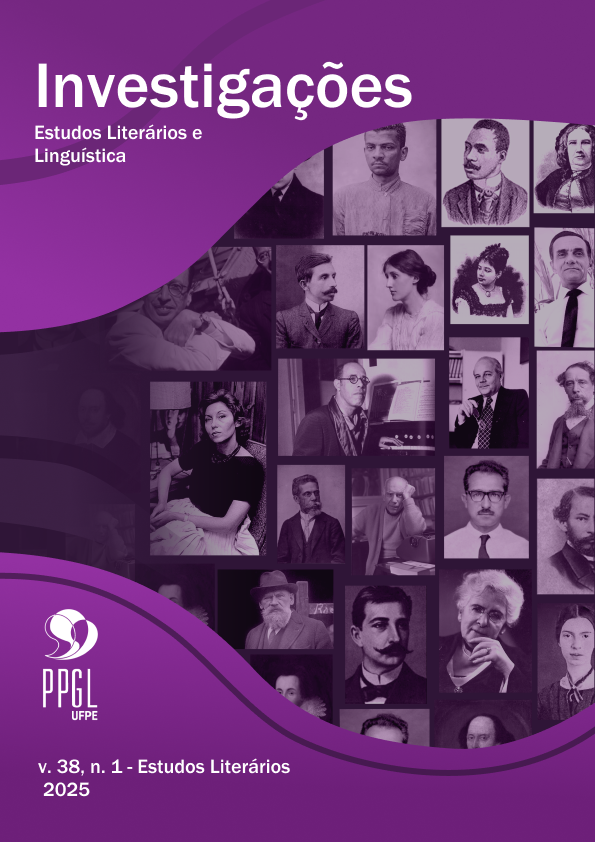The reflexive form in modern poetics: some paths on romantic irony
DOI:
https://doi.org/10.51359/2175-294x.2025.265173Keywords:
parabasis, romantic irony, formal self-reflection, modern lyricAbstract
The present work aims to historicize the reflective dimension in the arts, revisiting movements, works, and theoretical reflections relevant to its understanding, such as the notion of parabasis in classical comedy and the concept of romantic irony from early German Romanticism. These issues are explored to deepen the understanding of the intellective character that constitutes modern poetry, evident in its critical approach to the world and in the construction of a self-reflective poetic subjectivity — that is, one that reflects both on its position in the world and on its own compositional methods (the formation of an artistic subjectivity).
References
ARISTÓFANES. Os acarnenses. Trad. de Maria de Fátima Sousa Silva. Coimbra: Instituto Nacional de Investigação Científica, 1980.
BAUDELAIRE, Charles. As flores do mal. Trad. de Ivan Junqueira. Rio de Janeiro: Nova Fronteira, 1985.
BENJAMIN, Walter. O conceito de crítica de arte no Romantismo alemão. Trad. de Márcio Seligmann-Silva. São Paulo: Iluminuras, 2011.
BENJAMIN, Walter. Baudelaire e a modernidade. Trad. de João Barrento. Belo Horizonte: Autêntica, 2015.
CANDIDO, Antonio. Literatura e sociedade. 12ª ed. Rio de Janeiro: Ouro sobre Azul, 2011.
COTRIM, Ana. Literatura e realismo em György Lukács. Porto Alegre: Zouk Editora, 2016.
DUARTE, Adriane da Silva. O dono da voz e a voz do dono: a parábase na comédia de Aristófanes. São Paulo: Humanitas; FAPESP, 2000.
FERNANDES, Marcos Rogério Cordeiro. Paradoxos do sujeito (lírico) na obra de Carlos Drummond de Andrade. Verbo de Minas, Juiz de Fora, v. 2, p. 32-53, 2005.
FRIEDRICH, Hugo. Estrutura da lírica moderna: (da metade do século XIX a meados do século XX). Trad. de Marise Curioni e Dora F. da Silva. São Paulo: Duas Cidades, 1978.
HOBSBAWM, Eric. A era das revoluções, 1789-1848. 35. ed. Rio de Janeiro: Paz e Terra, 2015.
KOFLER, Leo. História e dialética: estudos sobre a metodologia da dialética marxista. Trad. de José Paulo Netto. Rio de Janeiro: Editora UFRJ, 2010.
LUKÁCS, György. A teoria do romance: um ensaio histórico-filosófico sobre as formas da grande épica. Trad. de José Marcos Mariani de Macedo. São Paulo: Duas Cidades; Editora 34, 2009.
MARX, Karl. O capital: crítica da economia política. Trad. de Rubens Enderle. Livro 1. 2. ed. São Paulo: Boitempo, 2017.
MEDEIROS, Constantino Luz de. A forma do paradoxo: Friedrich Schlegel e a ironia romântica. Trans/Form/Ação, Marília, v. 37, n. 1, jan./abr. 2014.
MUECKE, D. C. A ironia e o irônico. Trad. de Geraldo Gerson de Souza. São Paulo: Perspectiva, 1995.
NOVALIS. Pólen: fragmentos, diálogos, monólogo. Trad. de Rubens Rodrigues Torres Filho. São Paulo: Iluminuras, 1988.
SARTRE, Jean Paul. Baudelaire. 44. ed. Paris: Gallimard, 1947.
SCHILLER, Friedrich von. Poesia ingênua e sentimental. Trad. de Márcio Suzuki. São Paulo: Iluminuras, 1991.
SCHLEGEL, Friedrich von. Fragmentos sobre poesia e literatura (1797-1803): seguido de Conversa sobre poesia. Trad. de Constantino Luz de Medeiros, Márcio Suzuki. São Paulo: Editora Unesp, 2016.
SCHOENTJES, Pierre. La poética de la ironía. Trad. de Dolores Mascarell. Madrid: Cátedra, 2003.
SCHWARZ, Roberto. “Adequação nacional e originalidade crítica”. In: Sequências brasileiras: ensaios. São Paulo: Companhia das Letras, 1999.
SOUZA, Ronaldes de Melo e. Introdução à poética da ironia. Linha de Pesquisa, Rio de Janeiro, v. 1, n. 1, p. 27-48, 2000.
Downloads
Published
How to Cite
Issue
Section
License
Copyright (c) 2025 Henrique Barros Ferreira

This work is licensed under a Creative Commons Attribution 4.0 International License.
Authors who publish with Revista Investigações agree to the following terms:
Authors retain copyright and grant the journal right of first publication with the work simultaneously licensed under the Creative Commons Attribution 4.0 International (CC BY 4.0) license that allows others to share the work with an acknowledgement of the work's authorship and initial publication in this journal.
Authors are able to enter into separate, additional contractual arrangements for the non-exclusive distribution of the journal's published version of the work (e.g., post it to an institutional repository or publish it in a book), with an acknowledgement of its initial publication in this journal.
You are free to:
Share — copy and redistribute the material in any medium or format for any purpose, even commercially.
Adapt — remix, transform, and build upon the material for any purpose, even commercially.
The licensor cannot revoke these freedoms as long as you follow the license terms.
Under the following terms:
Attribution — You must give appropriate credit , provide a link to the license, and indicate if changes were made . You may do so in any reasonable manner, but not in any way that suggests the licensor endorses you or your use.
No additional restrictions — You may not apply legal terms or technological measures that legally restrict others from doing anything the license permits.

